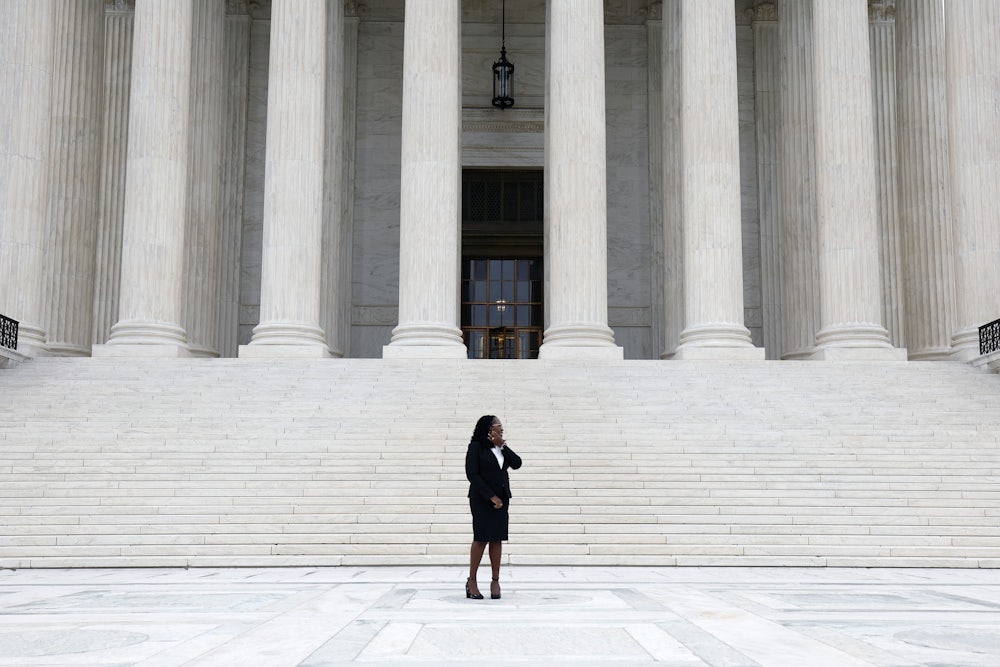On Tuesday, the Supreme Court’s newest member, Ketanji Brown Jackson, sent legal Twitter ablaze with the sharp comments she offered during oral arguments in Merrill v. Milligan, the latest conservative effort to gut the Voting Rights Act. As Justice Jackson vigorously debunked the right’s shameless revisionist history of the Fourteenth Amendment, the establishment left rejoiced: The newest liberal justice appeared to be a difference-maker—“mak[ing] waves” and “grab[bing] the spotlight.” One prominent legal journalist predicted that Jackson was surely “going to burn Scalia’s legacy to the ground.” That’s quite a review on her big debut—one that came coupled with conservatives having an utter meltdown over her questions and reasoning.
If you’re excited about Jackson’s first turn in the trenches of oral arguments, it’s likely because you have observed some basic things about the Supreme Court over the past decade. You’ve likely noticed that the American public has been, in recent years, inexorably bombarded with far-right rulings that lay waste to a wide array of progressive priorities, from abortion to gay rights, to gun control, and on and on. Musings from the legal academy about possible “compromises” and “middle grounds” are proffered and then soundly rejected, as the archconservative majority unapologetically checks every box on Mitch McConnell’s wish list. And this reign of terror began well before Justices Anthony Kennedy and Ruth Bader Ginsburg were replaced with the latest Federalist Society stalwarts, Brett Kavanaugh and Amy Coney Barrett. Indeed, with the Supreme Court gearing up to decide yet another batch of hugely impactful cases—stretching from voting rights to affirmative action and more—you are to be forgiven for being a bit more circumspect about what Jackson is likely to offer as the newest member of a three-person liberal minority.
Naturally, none of this changes the facts that were already in evidence: Jackson, by all measures, is an extraordinarily capable and effective jurist whose presence on the high court is welcomed. And it’s true that the task that she will be primarily engaged in—writing dissents as a member of the losing minority—has played a very influential role in transforming the law over time.
But it is hardly satisfying to hear that the Republican Party’s brazen hijacking of the nation’s judiciary will be compensated with a mere opportunity to influence the law some small way in the distant future. It’s also noteworthy that the most riveting examples of a dissent eventually becoming influential legal writ—from Clarence Thomas’s once-fringe views on abortion and affirmative action to Antonin Scalia’s pleas to expand executive power—were paired with an aggressive conservative political movement determined to win these ideological wars. As of now, no such movement exists on the political left to provide Jackson’s dissents—and let’s remember, she’s yet to write one for the high court—with similar rhetorical and political bolstering. As New Republic contributor Simon Lazarus has repeatedly urged, this is a project that liberals desperately need to take up.
Whether Jackson’s efforts to overcome conservative jurisprudence prove successful remains to be seen, but the knee-jerk reaction to her opening performance is an unfortunate illustration of the establishment left’s broken view of power. It’s hard not to see parallels to Ruth Bader Ginsburg, who was heralded as a progressive hero—endlessly memeified as “Notorious RBG”—even as her famous dissents in cases involving voting rights and abortion failed to durably change the trajectory of the law.
This was an obvious result to most, given the composition of the court, but the Democratic establishment, prioritizing stability over substantive results, resisted calls for more aggressive institutional interventions, throwing cold water on proposals such as court expansion. Tragically, the greatest inflection point in Ginsburg’s career may very well end up being her replacement by Amy Coney Barrett, whose appointment radically changed the composition of the court, spelling the end of Roe’s abortion rights protections and, likely, much, much more.
We see this dynamic in the broader political context as well. From Speaker Nancy Pelosi’s resistance to impeach President Trump in the wake of the January 6 insurrection to the Democratic leadership’s insistence on elevating “kitchen table issues” above GOP extremism, the mainstream left takes a trickle down–like approach to political power: just let the horrors of the modern GOP speak for themselves, and the voters will take care of the rest. Politics, to the establishment left, is self-executing, and direct, aggressive intervention from political leaders (such as calling for court expansion or abolishing the filibuster) is not only unnecessary but potentially harmful.
In the context of the Supreme Court, it’s worth considering what exactly those celebrating Jackson’s debut expect to happen. The thinking appears to be that one-upping Samuel Alito at oral arguments and carefully debunking the right’s technical legal arguments will lead to the Supreme Court, despite being firmly in the grip of a 6–3 conservative majority, somehow beginning to move in the right direction, presumably through persuasion, shame, or public outcry. The mere presence of effective justices confirms the inherent resilience and legitimacy of the institution itself, and it’s only a matter of time before the rot is rooted out.
But anyone with even a shred of experience observing this court—and its growing turn toward a form of judicial Calvinball that makes a mockery of legal traditions, precedents, and even facts—should understand that expecting a change of trajectory in the near future is fruitless. The reality is, Jackson does not represent some sea change in public opinion or liberal jurisprudence. The Supreme Court has long been out of step with public opinion on almost every major issue, but its rightward shift has only gained steam. What we’re left with is a severe structural dysfunction, not a mere political setback that can be remedied through the normal avenues of persuasion and effective messaging. Jackson, in other words, cannot remedy from within an institution that’s been reverse-engineered to work against her. Pretending otherwise is not only grievously unfair to her but guaranteed to breed further futility and cynicism.
As we have learned over and over again, our political system is not going to self-produce some kind of automatic reckoning for the Supreme Court or the Republican Party more broadly. Short of direct, institutional confrontation by our political leaders, Jackson will spend her career holding very little power beyond her ability merely to demonstrate her competent practice of a legal tradition that’s no longer applicable. Her arguments will have merit and will be, to many, convincing. They will also mostly be demonstrations of shouting into the void. Democrats need major structural reform, and there are no shortcuts to achieving it.










